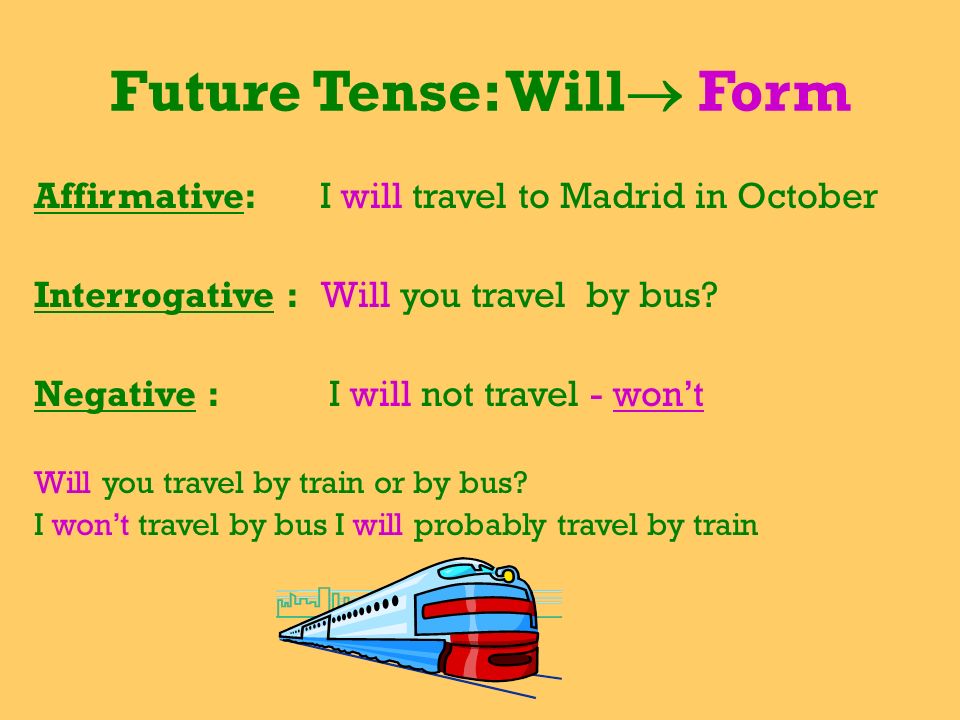The most common way to talk about things and events in the future is to use the verb ‘will’. This is the Future Simple tense.



How to form Future Simple
Statements
To form the Future Simple in positive sentences, we use:
will (’ll) + the verb (base form without ‘to’)
| Singular | Plural |
| I will (’ll) sing You’ll sing He/she/it’ll sing | We’ll sing You’ll sing They’ll sing |
- The train will arrive in an hour.
- I have a nice dress. I’ll go to the party tonight!
- Your brother will become famous soon.
Negative sentences
To make negative statements in Future Simple, we use:
will not (won’t) + the verb (base form without ‘to’)
| Singular | Plural |
| I will not (won’t) eat You won’t eat He/she/it won’t eat | We won’t eat You won’t eat They won’t eat |
- It’s too late; I won’t go through that park.
- That’s a very big pizza. We won’t finish it.
- Pete is in New York. He will not travel to Brazil with us.
Questions
To make questions in Future Simple, we rearrange the word order and use:
will + subject + the verb (base form without ‘to’)
| Singular | Plural |
| Will I be fine? Will you be fine? Will he/she/it be fine? | Will we be fine? Will you be fine? Will they be fine? |
- Will you be at work tomorrow?
- Will you help me with my homework?
Let’s summarize:



When to use ‘will’ for future
We can use ‘will’ in English in several ways:
1) to describe a quick decision that you have made at the time of speaking:
- Oh, it’s raining! I’ll take my umbrella.
- What would you like? — I’ll have a tea, please.
- Patrick finally dared to ask: “Will you marry me, Cindy?”
- This cake looks very small. Will it be enough for all of us?
2) to make a prediction about what you think is going to happen – even if there is no firm evidence for that prediction:
- Mary’s preparing for her exam. I believe she will do very well tomorrow.
- Wait a few minutes. I think it will stop raining soon.
3) to offer to do something:
- You look tired. We’ll make you a cup of coffee.
- Is that the phone? I’ll answer it.
4) when making a promise:
- Don’t worry, mom, I’ll be careful.
- We will be there by eight, I promise.
5) to make a suggestion (with ‘shall‘):
- Shall we eat out tonight?
- Shall I help you with your homework?
6) to ask people to do something:
- Will you help me wash the car?
- Will you give me a ride?
Shall
We can use ‘shall’ instead of ‘will’ when asking for a decision, making polite offers or suggestions, or in more formal situations.
- When shall I meet you?
- What film shall we see?
We form questions with ‘shall’ like this:
(question word) + shall + subject + the verb (base form without ‘to’)
| Note: We can start the question with ‘shall’ and no question word if it is not required. |
| Singular | Plural |
| Shall I visit? Shall you visit? Shall he/she/it visit? | Shall we visit? Shall you visit? Shall they visit? |
- Shall we have a cup of tea?
- That’s a good idea.
- You look tired. Shall I drive?
- We shall go there together.
| Note: We can use ‘shall’ to talk about future actions and events, but it is only used with ‘I’ or ‘we’ and mostly in British English. |
Watch this video from Crown Academy of English to understand how to use ‘will’ to describe future actions and events correctly:
Read more about future tenses: